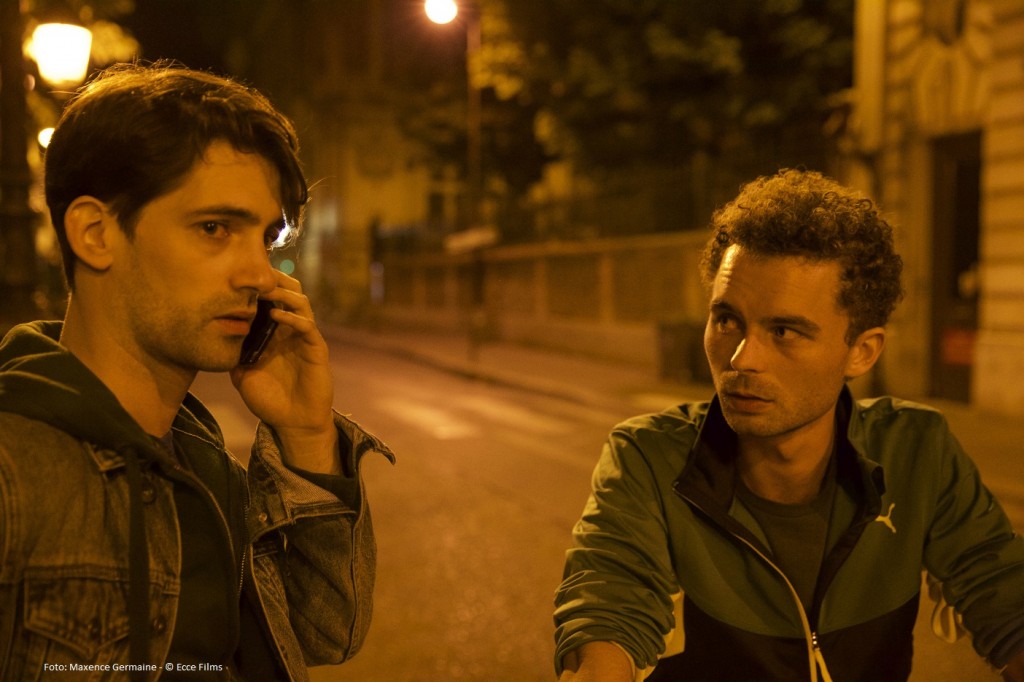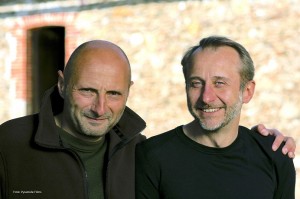In their new feature film "Théo & Hugo", Olivier Ducastel and Jacques Martineau tell the story of gay city life: of the goings-on in darkrooms and unsafe sex in moments of great lust. A conversation with the Parisian filmmakers about real sex in front of the camera, PEP and living with HIV in cinema.
Of course, we first have to talk about the long opening scene: for 20 minutes we watch the two film heroes Théo and Hugo having sex and falling in love in the middle of an orgy. How do you find the right leading actors for this film? Did you specifically look for porn stars or did you persuade actors to have sex in front of the camera?
Jacques MartineauWe actually initially had the idea of casting porn actors, but it's really damn hard to find one who can actually act. The other problem: French porn actors want to remain as anonymous as possible and not become known to a wider audience. We then took the usual route, with castings and screen tests in which the actors played a dialogue from the script in pairs.
Olivier Ducastel: And had to kiss.
JacquesYes, kissing was important. I think we really made a lucky choice with Geoffrey Couët and François Nambot. As a couple, they were convincing right from the start. There was this decisive energy between the two of them. That was the famous magic moment.
OlivierWe didn't have to persuade them to do anything and they already knew what we were planning before the test shoot. We had also written the script as specifically as possible so that they knew in detail from the very first moment what we wanted to film and what we expected.
Jacques: It was the first time the two actors had filmed sex scenes. And for us too, by the way.
These first 20 minutes of the film in the sex club are extraordinary in many ways. What was your intention? Did you want to write (gay) film history with it? You were surely aware that this film would therefore never be shown on prime time television and that some viewers, especially heterosexual men, would be put off going to the cinema. So it was a bad decision commercially, wasn't it?
Jacques: If all gay people watched the film instead, we would be very happy! (laughs). With this project, however, we weren't speculating on making gay film history, nor were we aiming to provoke a conservative audience. We did, however, want to challenge ourselves: Would we actually succeed in realising a scene like this in the way we imagined when writing the script? In other words, to show sex without resorting to the visual language of pornography? To make the intimacy between two people tangible and depict sex as naturally as possible? We weren't really sure. It could have been quite boring. Just because it's "real" sex doesn't mean it has to be interesting, exciting or beautiful.
Why do you let the two men meet in a sex club of all places?
JacquesWe wanted to show love and falling in love in a sensual, but also very physical way, so not the usual romantic version. It's usually like that: Two people get to know each other and as viewers we wait to see when they will finally have sex. Here we do it the other way round. They have sex right at the beginning - and can then concentrate on the other important things.
OlivierIt was important to us to show that even in a place where men initially only meet for sex, love can also develop.
JacquesWe wanted to show that there can be risks involved in sex - especially in an orgy like the one that takes place in this sex club. And we also wanted to show how to deal with this kind of accident.

The film is therefore also a novelty in another respect. It is probably the first feature film ever to focus on post-exposure prophylaxis - PEP for short. In other words, precautionary HIV therapy after a "sexual accident" in which an HIV infection may have occurred. Was this part one of the central aspects around which you built your story from the outset?
Jacques: This part was added later. We initially wanted to tell a special love story between two men. And as is the case with filming, the characters kept changing over time and with the different versions.
OlivierThe starting point, however, was a serodifferent couple from the beginning; one HIV-positive, the other not.
JacquesWhen we came across the PEP, I can't really remember exactly. It was interesting that friends and colleagues we spoke to about the script were particularly interested in this aspect. A lot of them knew nothing about it at all, while others had already had their own experiences with PEP and had actually sat in a hospital emergency room on a Sunday morning and picked up the tablets. So it's not as rare as some might think.

What is perhaps somewhat surprising for HIV experts - from a German perspective - is that Hugo is HIV-positive, in treatment and below the detection limit. Even if the rubber was left off during sex, there was actually no risk of infection for Theo. In a German clinic, he would therefore probably not have been prescribed PEP or a rapid HIV test would have been carried out first to clarify whether he was already infected with HIV.
OlivierWe have depicted the exact procedure that is provided for in the French healthcare system for such cases. Because it's the middle of the night, Theo and Hugo can't go to a special Aids centre, but can only go to the emergency clinic, where the relevant tests can't be carried out. Theo then has to see a specialist the next day. Because HIV medication works better the earlier it is taken after a possible risk of infection, patients like Theo are given a three-day supply of tablets to be on the safe side. The specialist must then decide whether it is necessary to continue the PEP - or not.
Jacques: Incidentally, these scenes in the hospital were the first time we worked with non-actors. The doctor in the hospital is a real doctor and we were extremely lucky with her. She was able to completely ignore the fact that we were shooting a film and that she had an actor in front of her. She treated him just as sensitively as she does in such situations in her day-to-day work at the hospital.
There are now many films about AIDS, especially about dying as a result of immunodeficiency. In other words, stories that are mostly set in the peak phase of the AIDS crisis at the end of the 1980s and before the introduction of highly active antiretroviral therapy. In contrast, there are hardly any films or TV series that depict life with HIV in times of ART, let alone with PEP and PrEP and non-infectiousness.
Jacques: We are not to blame! We are doing our best! (Laughs)
Olivier: We have already been pioneers in this respect. "Felix" was the first French cinema film with an HIV-positive main character who is undergoing treatment and living a completely normal life despite his infection.
Why do you think such films are so rare?
Olivier: Because nobody cares. This is obviously not dramatic film material that seems to interest a wider audience.
Was it therefore difficult for you to find financiers for your new film?
JacquesWe financed the film without any state film funding or involvement from a TV station. After the first cancellation, we therefore decided not to waste time unnecessarily. The money now came exclusively from the producer and the French distributor. They took a big risk and we only had a modest budget at our disposal, but we had unrestricted artistic freedom.
A detailed Review of the film can be found here in the blog










